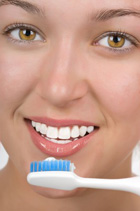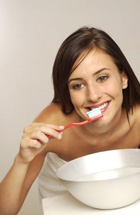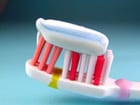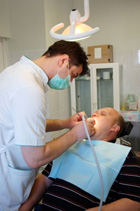 We all know how important it is to take care of our teeth with effective brushing at home. By brushing twice a day you are stopping the build up of plaque which, if left unchecked, can cause cavities to form and dental decay to occur. But there are so many varieties of tooth paste on offer, it be confusing to know which one to choose.
We all know how important it is to take care of our teeth with effective brushing at home. By brushing twice a day you are stopping the build up of plaque which, if left unchecked, can cause cavities to form and dental decay to occur. But there are so many varieties of tooth paste on offer, it be confusing to know which one to choose.
Tooth paste ought to be applied to the bristles of your tooth brush when you are brushing your teeth. You should be using about a pea sized amount. Any more is unnecessary and wasteful and using less will be ineffective. Children ought to be especially careful an infants under two would do best to avoid tooth pastes fortified with fluoride.
For anyone older than two, tooth pastes enriched with fluoride can be very beneficial to teeth. This is because fluoride helps to strengthen enamel. Enamel is the tough substance which coats teeth and helps protect them from plaque. Most modern tooth pastes contain fluoride and it is also to be found in tap water.
Although increasingly rare, some tooth pastes contain alcohol. Alcohol is extremely effective at killing bacteria but it doesn’t discriminate and also kills the ‘good’ bacteria in the mouth. Tooth pastes containing alcohol and bicarbonate of soda can also help to make bad breath worse. This is because they leave the mouth in ideal conditions for the bad breath bacteria to flourish.
The next time you see your Leeds dentist, be sure to ask them about tooth paste. He or she is a trained professional and knows all about tooth pastes and which one will be best for your unique mouth.





 Being told that you have cancer can be one of the most devastating pieces of news you ever receive. But though the treatment of cancer has evolved greatly over the last 50 years, it is in response to the fact that cancer is still on the increase, as it is in the mouth. Oral cancer is considered to be directly linked to diet, stress and poor oral hygiene that work their way throughout the body. Only by understanding the causes of cancer and the signs of it, can we prevent it happening in Leeds. There are many early signs of the disease in the mouth; patches in the mouth, bad breath, sores or ulcers that won’t go away, swallowing pains, loose teeth and constant earaches. Any problems like these should be discussed with your dentist immediately so that the cancer can be caught as early as possible. They can run a series of simple tests through cell and tissue diagnosis of the mouth. Sometimes a blood test at the doctors can also highlight any abnormalities. If anything shows up, more intensive tests can be done to gauge the extent of the problem and give a better understanding of the treatment required. If cancer is caught early, it can be treated a lot easier and though the thought of being diagnosed with oral cancer is very frightening, success rates of treatment are on the increase, thanks to advances in technology and our understanding of what cancer is causes it. Learn all you can about it, how to fight it and how to prevent it- it can be beaten.
Being told that you have cancer can be one of the most devastating pieces of news you ever receive. But though the treatment of cancer has evolved greatly over the last 50 years, it is in response to the fact that cancer is still on the increase, as it is in the mouth. Oral cancer is considered to be directly linked to diet, stress and poor oral hygiene that work their way throughout the body. Only by understanding the causes of cancer and the signs of it, can we prevent it happening in Leeds. There are many early signs of the disease in the mouth; patches in the mouth, bad breath, sores or ulcers that won’t go away, swallowing pains, loose teeth and constant earaches. Any problems like these should be discussed with your dentist immediately so that the cancer can be caught as early as possible. They can run a series of simple tests through cell and tissue diagnosis of the mouth. Sometimes a blood test at the doctors can also highlight any abnormalities. If anything shows up, more intensive tests can be done to gauge the extent of the problem and give a better understanding of the treatment required. If cancer is caught early, it can be treated a lot easier and though the thought of being diagnosed with oral cancer is very frightening, success rates of treatment are on the increase, thanks to advances in technology and our understanding of what cancer is causes it. Learn all you can about it, how to fight it and how to prevent it- it can be beaten. Maintaining your oral hygiene helps you to smile with confidence and avoid painful and unsightly conditions. To prevent a build-up of plaque bacteria, which can cause diseases in the mouth, a regular routine of brushing and flossing must be pursued. A healthy mouth means one that has teeth which are clean and free from debris, pink gums and an absence of bad breath.
Maintaining your oral hygiene helps you to smile with confidence and avoid painful and unsightly conditions. To prevent a build-up of plaque bacteria, which can cause diseases in the mouth, a regular routine of brushing and flossing must be pursued. A healthy mouth means one that has teeth which are clean and free from debris, pink gums and an absence of bad breath. Chewing gums benefits can be substantial to our oral health. Whether it is to freshen breath or contribute to increased production of saliva, many of us chew gum. Saliva is a vital force in protecting our teeth from the damaging effects of plaque and chewing gum is one of the simplest ways to achieve that.
Chewing gums benefits can be substantial to our oral health. Whether it is to freshen breath or contribute to increased production of saliva, many of us chew gum. Saliva is a vital force in protecting our teeth from the damaging effects of plaque and chewing gum is one of the simplest ways to achieve that. Maintaining your home oral hygiene routine is vital in maintaining healthy teeth and gums. Six month check ups with your dentist are very important, as is pursuing a balanced diet, but in the mean time it is crucial that you take good care of your teeth at home by brushing and flossing.
Maintaining your home oral hygiene routine is vital in maintaining healthy teeth and gums. Six month check ups with your dentist are very important, as is pursuing a balanced diet, but in the mean time it is crucial that you take good care of your teeth at home by brushing and flossing. According to a dentist in Leeds, there is no precise science to brushing you teeth correctly. Each mouth is unique and has different requirements and there are so many factors to consider before you even put the brush into your mouth. Gums and teeth may react differently to soft and hard brushes- small, large and angled heads and let’s not forget the electric choice. Then there’s the subject of toothpastes; these too come in different guises. Some may be suited for sensitive teeth, some have whitening properties, but all should come recommended. Finding the brush and paste that suits you is down to experimenting, but consulting with your dentist will make your choices easier. When we finally arrive at the brushing stage, it is generally considered that you should start at the front of the mouth on the inside and work towards the back, bringing the brush off the gums- the same procedure is applied on the outside. In the case of electric brushes, the work is done for you. There are many to choose from and again it’s down to personal choice, but in time, you will find what’s good for you- it’s a matter of ‘horses for courses’. To ensure success through brushing, flossing and rinsing are a natural support for the best results.
According to a dentist in Leeds, there is no precise science to brushing you teeth correctly. Each mouth is unique and has different requirements and there are so many factors to consider before you even put the brush into your mouth. Gums and teeth may react differently to soft and hard brushes- small, large and angled heads and let’s not forget the electric choice. Then there’s the subject of toothpastes; these too come in different guises. Some may be suited for sensitive teeth, some have whitening properties, but all should come recommended. Finding the brush and paste that suits you is down to experimenting, but consulting with your dentist will make your choices easier. When we finally arrive at the brushing stage, it is generally considered that you should start at the front of the mouth on the inside and work towards the back, bringing the brush off the gums- the same procedure is applied on the outside. In the case of electric brushes, the work is done for you. There are many to choose from and again it’s down to personal choice, but in time, you will find what’s good for you- it’s a matter of ‘horses for courses’. To ensure success through brushing, flossing and rinsing are a natural support for the best results. Oral hygiene is one of the most important factors in keeping the mouth fresh and free from disease, according to dentists in Leeds, yet one of the most poorly practised. Cleaning your teeth is central in the fight against tooth decay, plaque, tartar and gum disease. If bacterial plaque is allowed to build up it forms tartar- leading to cavities and infection of the gums. 75% of cavities or caries, occur on the chewing surface of the tooth that is hard to reach and the build up of acids begin the tooth decay process. Gums will bleed and infection will set in. Brushing is paramount- choosing the right brush and tooth paste is too. Dentists recommend cleaning at least twice a day and after meals with a brush that is designed for you. Bleeding gums can be combated by rinsing with warm, salty water. But food has a habit of getting in places where the brush will not reach. This calls for flossing to remove the food and check the build up of plaque. Keeping the tongue clean is important, by light brushing and mouthwashes. A dentist will also advocate professional cleaning twice a year, de-scaling and polishing the teeth, and if required, debridement, followed by a good fluoride treatment. A good diet helps in the growth of healthy, strong teeth. Vitamin’s A and C, and polyphenol antioxidants can be found in fruit and vegetables, green tea, milk and cheese, all will maintain a ph balance in the mouth. Keeping your mouth healthy is important to the whole of body. Bad oral hygiene can lead to pneumonia, heart disease, diabetes and osteoporosis (weak bones).
Oral hygiene is one of the most important factors in keeping the mouth fresh and free from disease, according to dentists in Leeds, yet one of the most poorly practised. Cleaning your teeth is central in the fight against tooth decay, plaque, tartar and gum disease. If bacterial plaque is allowed to build up it forms tartar- leading to cavities and infection of the gums. 75% of cavities or caries, occur on the chewing surface of the tooth that is hard to reach and the build up of acids begin the tooth decay process. Gums will bleed and infection will set in. Brushing is paramount- choosing the right brush and tooth paste is too. Dentists recommend cleaning at least twice a day and after meals with a brush that is designed for you. Bleeding gums can be combated by rinsing with warm, salty water. But food has a habit of getting in places where the brush will not reach. This calls for flossing to remove the food and check the build up of plaque. Keeping the tongue clean is important, by light brushing and mouthwashes. A dentist will also advocate professional cleaning twice a year, de-scaling and polishing the teeth, and if required, debridement, followed by a good fluoride treatment. A good diet helps in the growth of healthy, strong teeth. Vitamin’s A and C, and polyphenol antioxidants can be found in fruit and vegetables, green tea, milk and cheese, all will maintain a ph balance in the mouth. Keeping your mouth healthy is important to the whole of body. Bad oral hygiene can lead to pneumonia, heart disease, diabetes and osteoporosis (weak bones). Oral hygiene isn`t a thing we can take lightly, a City ofl Leeds dentist explains. It is a necessary tool in war against premature tooth decay, which is caused mostly by a lax regime that allows the enemy to multiply. The enemy of your teeth is the bacteria that comes with our food, we can`t eliminate that in the food, but we can stop it feeding and producing harmful acid. Acid is the foremost reason for early tooth decay, and it is easily kept under control with a simple, but affective oral hygiene regime. This must be kept up during the day as well as in the morning and just before bedtime. Night time is when the saliva gland dries up and allows the acid to accumulate the most, therefore doing the most damage; saliva will act as an alkali to the acid and prevent it eating away at the tooth enamel. It is so important to keep this in mind when you are cleaning your teeth at night, first of all give your teeth a good flossing, get right in between those molars. Removing the food debris will starve the bacteria and prevent them not only producing acid, but also producing tartar which will be deposited onto your teeth. If I tell you that tartar is dead bacteria, then that should help you be more rigid in your dental oral cleaning regime. Next you will need to vigorously brush the teeth, again getting in between them and removing even more food build up, and finally a good rinse will remove whatever is left.
Oral hygiene isn`t a thing we can take lightly, a City ofl Leeds dentist explains. It is a necessary tool in war against premature tooth decay, which is caused mostly by a lax regime that allows the enemy to multiply. The enemy of your teeth is the bacteria that comes with our food, we can`t eliminate that in the food, but we can stop it feeding and producing harmful acid. Acid is the foremost reason for early tooth decay, and it is easily kept under control with a simple, but affective oral hygiene regime. This must be kept up during the day as well as in the morning and just before bedtime. Night time is when the saliva gland dries up and allows the acid to accumulate the most, therefore doing the most damage; saliva will act as an alkali to the acid and prevent it eating away at the tooth enamel. It is so important to keep this in mind when you are cleaning your teeth at night, first of all give your teeth a good flossing, get right in between those molars. Removing the food debris will starve the bacteria and prevent them not only producing acid, but also producing tartar which will be deposited onto your teeth. If I tell you that tartar is dead bacteria, then that should help you be more rigid in your dental oral cleaning regime. Next you will need to vigorously brush the teeth, again getting in between them and removing even more food build up, and finally a good rinse will remove whatever is left. Regular dental cleaning should be a very important part of your healthcare program says a dentist from Leeds. A person has to go to the dentist at least every 6 months for a thorough cleaning because there are added benefits to it than just having clean teeth. The first and most evident reason is that you will be free from bad breath that is caused by unclean teeth.
Regular dental cleaning should be a very important part of your healthcare program says a dentist from Leeds. A person has to go to the dentist at least every 6 months for a thorough cleaning because there are added benefits to it than just having clean teeth. The first and most evident reason is that you will be free from bad breath that is caused by unclean teeth. There are many causes for bad breath, such as digestive problems, but the most common ones are to do with oral hygiene. If you suffer from this problem then you should visit your dentist immediately. Leeds has many excellent dental clinics and you should be able to find one without too much trouble. Your teeth and gums will get a thorough check up and cleaning so that anything causing the problem will be removed or repaired.
There are many causes for bad breath, such as digestive problems, but the most common ones are to do with oral hygiene. If you suffer from this problem then you should visit your dentist immediately. Leeds has many excellent dental clinics and you should be able to find one without too much trouble. Your teeth and gums will get a thorough check up and cleaning so that anything causing the problem will be removed or repaired.

